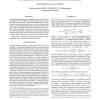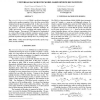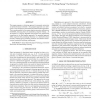121
click to vote
ICASSP
2008
IEEE
15 years 7 months ago
2008
IEEE
We propose new algorithms for estimating autoregressive (AR), moving average (MA), and ARMA models in the spectral domain. These algorithms are derived from a maximum likelihood a...
78
Voted
ICASSP
2008
IEEE
15 years 7 months ago
2008
IEEE
This paper describes unsupervised speech/speaker cluster validity measures based on a dissimilarity metric, for the purpose of estimating the number of clusters in a speech data s...
ICASSP
2008
IEEE
15 years 7 months ago
2008
IEEE
109
click to vote
ICASSP
2008
IEEE
15 years 7 months ago
2008
IEEE
The theory of compressive sensing has shown that sparse signals can be reconstructed exactly from many fewer measurements than traditionally believed necessary. In [1], it was sho...
ICASSP
2008
IEEE
15 years 7 months ago
2008
IEEE
In design of experiments for nonlinear regression model identification, the design criterion depends on the unknown parameters to be identified. Classical strategies consist in ...
ICASSP
2008
IEEE
15 years 7 months ago
2008
IEEE
Corpus-based concatenative speech synthesis is very popular these days due to its highly natural speech quality. The amount of computation required in the run time, however, is of...
143
Voted
ICASSP
2008
IEEE
15 years 7 months ago
2008
IEEE
Compressive sensing aims to recover a sparse or compressible signal from a small set of projections onto random vectors; conventional solutions involve linear programming or greed...
102
click to vote
ICASSP
2008
IEEE
15 years 7 months ago
2008
IEEE
Discriminative training for language recognition has been a key tool for improving system performance. In addition, recognition directly from shifted-delta cepstral features has p...
ICASSP
2008
IEEE
15 years 7 months ago
2008
IEEE
In the case of multicomponent AM-FM signals, the idealized representation which consists of weighted trajectories on the time-frequency (TF) plane, is intrinsically sparse. Recent...
104
Voted
ICASSP
2008
IEEE
15 years 7 months ago
2008
IEEE
This paper proposes a clustering approach to parameter estimation in distributed sensor networks. The proposed approach is an alternative to the conventional centralized and decen...



